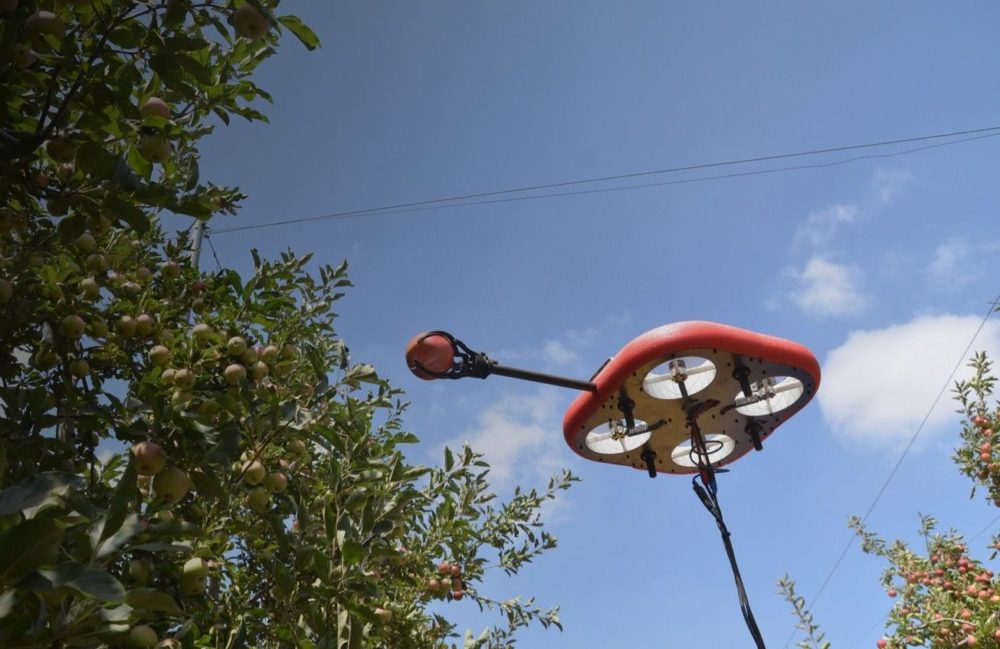Tevel Aerobotics Technologies, which is developing autonomous flying robots that can pick fruit, has raised $20 million in fresh funding.
Among the investors in this round were two major Asian ag equipment manufacturers: Japan’s Kubota and China’s Forbon. Participating alongside them were a host of VC firms including Maverick Ventures Israel, its compatriot OurCrowd, and US-based AgFunder. [Disclosure: AgFunder is AFN‘s parent company.]
Ziv Aviram — co-founder of self-driving car startup Mobileye, which was acquired by Intel for $15.3 billion in 2017 — and Amichai Steimberg, former CEO of electronics manufacturer Orbotech, also invested.
Tevel has designed a system of small, interconnected drones that can harvest orchard-grown fruits and carry out other tasks, such as pruning, trimming, and thinning, that would typically require human labor.
That labor is in increasingly short supply, with the UN’s Food & Agriculture Organization estimating the availability of orchard workers to have dropped by 50% over the past two decades – while agricultural fruit output has doubled over the same period.
“Farmers are struggling today with recruiting fruit pickers, a situation that puts the whole industry at risk,” said Tevel founder and CEO Yaniv Maor.
“The situation in orchards is worse than in greenhouses, for a few reasons. Fruit season in the orchard is shorter than for greenhouses and orchards are mostly located in remote villages [where] the local labor is not available, and the imported labor is not sufficient,” he told AFN.
“Tevel supplies autonomous harvesting on demand – anytime, anywhere, any capacity. Our flying robots gently pick the fruit without bruising it [and] they almost don’t leave any fruit on the trees.”
Looking a little like something out of War of the Worlds or Doctor Who, Tevel’s solution — named Flying Autonomous Robot (FAR) — is a mobile hive of drones, each equipped with a meter-long mechanical claw and AI-powered ‘eyes.’
Beyond picking, this potentially allows FAR to perform “any intensive selective task that requires accuracy,” Moav said.
“Our robots have excellent maneuverability – they can maneuver with six degrees of freedom. This enables us to pick almost all the fruit from trees, work with different orchard architecture — such as thick and thin trees, trellis systems, and round trees — and to pick many kinds of fruit with the same hardware.”
Tevel’s Wellsian creations also offer farmers the prospect of growing taller trees, as they can overcome “the limiting factor to access treetops,” Moav claimed.
“This can bring extra 10% to 20% of fruit to the same farm – which is not only more revenue, but extra profit to the farm.”
Tevel will use this latest funding to complete product validation, commence production, and launch its commercial service.
Some of the capital will also go towards the establishment of operational bases in Israel, Europe, and North America. Moav anticipates that FAR will be fully available to farmers by the end of 2021.
“For the average orchard, harvesting can represent 50% of the operating costs, a figure that increases in correlation with farm labor scarcity. The versatility and efficacy of Tevel’s FAR will change the way orchards operate globally,” AgFunder founding partner Michael Dean told AFN.
Forbon chairman and CEO Renzong Wang said in a statement that “the market opportunity [for FAR] in China is enormous.”
“China is the largest fruit producer in the whole world [but the] agriculture labor shortage already puts China in a very difficult situation, and it will become even more severe over time,” he said. “The industry desperately needs a feasible solution like Tevel’s.”
This latest $20 million round is the third that Tevel has raised following its $10 million Series A in 2019 and a $1.4 million seed round in 2017. It has also banked a $2.5 million grant from the Israel Innovation Authority.
Comment? News tip? Story idea? Email me at [email protected] or find me on LinkedIn and Twitter




